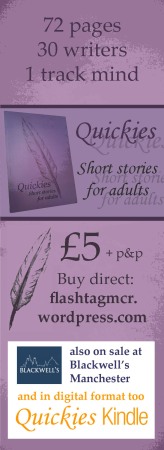The government slashed and burned with such ferocity, no-one listened to the screams of the poor. On November 14th, the economy collapsed with a thunderous roar: every major company went bust.
They tried to riot, the populous in their sackcloth togs, throwing their tin begging bowls with impotent anger. But the powers had ring-fenced the army so batons broke ribs and the hungry puked blood, sodden in warm red defeat.
In the murky autumn evenings, the tooth fairies still plied their trade, silent except for fingernails scrabbling on crumbling roof tiles. They’d scuttle through houses, sniffing for teeth under pillowed heads, trying not to jangle their coin bags.
The people would reach under their pillow on waking, feel the cold coin then weep with bitterness and delight. The pound or two they got for their tooth was extra gruel from a street vendor or a part-traded blow job from a needy neighbour.
Then came desperation. The poor would slaver through bloody mouths, having caved in their teeth with a brick, waiting for a night-time windfall. The white sprites flew in celebratory circles while their fairy dust clogged chimneys and gave thin boys asthma.
Some people revolted at the fairies’ power: “They don’t even give wishes.” The protesters created a black-market supply of cheap supermarket toothpaste. “Brush twice a day,” they said. And they slowly starved the fairies of income.
One by one, the fairies would drop from the sky, toothless and weak, exhausted from carrying an unwanted haul of coins, until there were millions of broken bodies littering the pavements.
A ravenous public tore off wings and feasted on the creatures’ bellies, devouring an endless supply of fairy limbs. The fairy dust poured from split guts into their mouths like champagne: it was sweet to the taste and fizzly on the tongue.
The dust got between teeth, formed tiny wells of sugary bacteria on gums. No-one noticed. They slept deeply, clutching their toothpaste. They dreamed of the future.
Words: 328
Read more of Fat Roland’s work on his blog.










